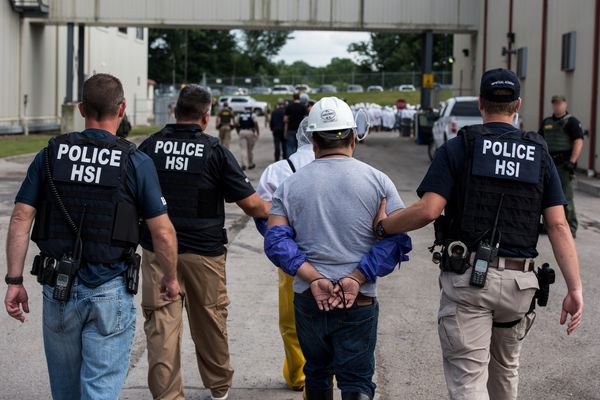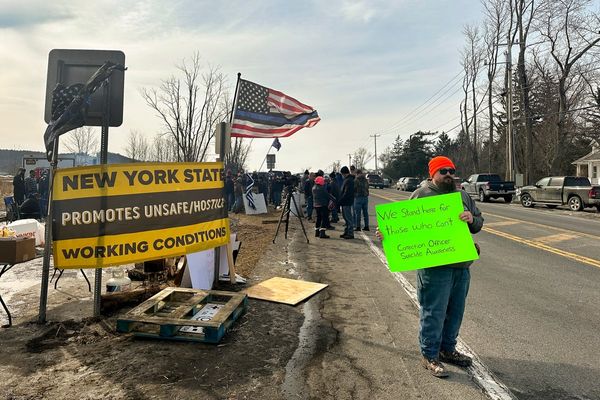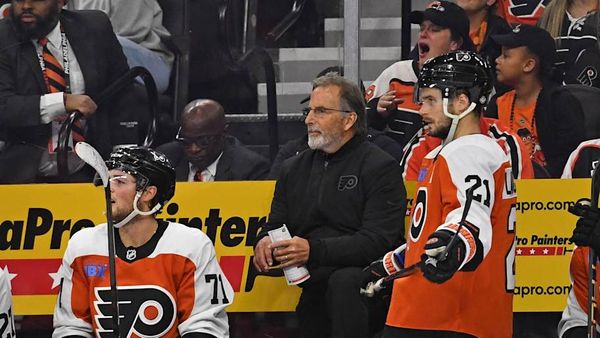
Lebanon’s Hezbollah says it has fired 200 rockets into Israel in one of its largest barrages yet, as Benjamin Netanyahu told the US that Israel will send a delegation to resume stalled negotiations with Hamas on a possible hostage release deal.
Israel confirmed the Iran-backed militant group had fired “numerous projectiles and suspicious aerial targets” from Lebanon on Thursday towards the occupied Syrian Golan Heights and more than 15 drones into Israeli territory, many of which it said were intercepted. An Israeli military spokesperson said there were no casualties reported.
Hezbollah said the barrage was in retaliation for a strike that killed one of its top commanders. It followed at least two attacks on Wednesday in response to what the group called “the assassination” of the commander Mohammed Nasser.
The militant group said it launched 100 Katyusha rockets at an Israeli military base in Golan and its Iranian-made Falaq missiles at another base in the town of Kiryat Shmona near the Israel-Lebanon border.
Nasser, killed by an airstrike near the city of Tyre in southern Lebanon, was one of the most senior Hezbollah commanders to die in the conflict, two security sources in Lebanon said. According to sources in Lebanon, he “was of great importance to Hezbollah”, which said he took part in battles in conflicts in Syria and Iraq from 2011 until 2016 and “fought in the group’s last war with Israel in 2006”.
US and French diplomats are working fervently to avert the escalation of tensions into a full-scale conflict, a scenario they worry may have ripple effects throughout the entire region.
Initial diplomatic attempts by Washington to maintain calm along the Lebanon-Israel border were conducted independently of the conflict in Gaza.
Hezbollah has declared its attacks on Israel to be in support of Hamas and indicated its willingness to halt its assaults if a ceasefire is reached in Gaza.
Israeli authorities, on the other hand, have said military action in Lebanon remains a potential course of action should diplomatic efforts prove unsuccessful.
Thursday’s attack came as Netanyahu prepared to convene a meeting of his security cabinet later in the day to discuss proposals from Hamas about a possible ceasefire deal in Gaza to pause the nearly nine-month war, a source in the Israeli prime minister’s office told Reuters.
Before the meeting, Netanyahu would have consultations with his ceasefire negotiations team, the source added.
Netanyahu told the US president, Biden, on Thursday that he had decided to send a delegation to resume stalled negotiations on a hostage release deal with Hamas, the two country’s administrations said.
In a phone call between the two leaders, Netanyahu repeated his position that Israel would end its nearly nine-month war in Gaza only when all its objectives had been achieved, his office said in a statement.
Israel received Hamas’s response on Wednesday to a proposal made public at the end of May by Biden that would include the release of about 120 hostages held in Gaza and a ceasefire in the Palestinian territory.
A Palestinian official close to the mediation effort told Reuters that Hamas had shown flexibility over some clauses, which would allow a framework agreement to be reached should Israel approve.
Hamas has said any deal must end the and bring about a full Israeli withdrawal from Gaza, while Israel maintains it will accept only temporary pauses in the fighting until Hamas is eradicated.
The strategy involves the step-by-step liberation of Israeli captives in Gaza and the withdrawal of Israeli troops during the initial two stages, alongside the release of Palestinian detainees. The third phase focuses on the rebuilding of the conflict-ravaged region and the repatriation of the deceased hostages’ remains.
‘’We hope that this is the end of the war, we are exhausted and we can’t stand more setbacks and disappointments,” said Youssef, a displaced person in Khan Younis, in southern Gaza. “Every hour into this war, more people die, and more houses get destroyed, so enough is enough. I say this to my leaders, to Israel and the world.”
On Thursday, tens of thousands of Palestinians continued to search for refuge after being ordered to evacuate, a directive that also encompassed the border city of Rafah.
The United Nations deemed this mandate as the most extensive since 1.1 million individuals were instructed to depart the northern region of Gaza in October.
The war began on 7 October when Hamas attacked southern Israel, killing about 1,200 people.
The military offensive launched by Israel in response has so far killed 38,011 Palestinians and injured 87,445, mostly women and children, the Gaza health ministry said on Thursday.
Associated Press and Reuters contributed to this report.







